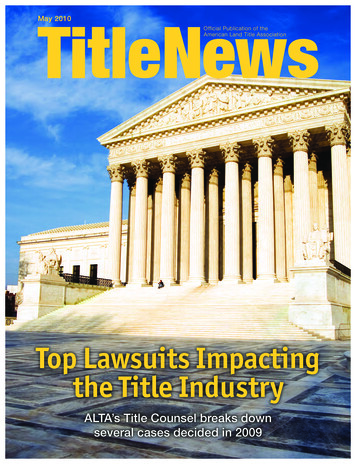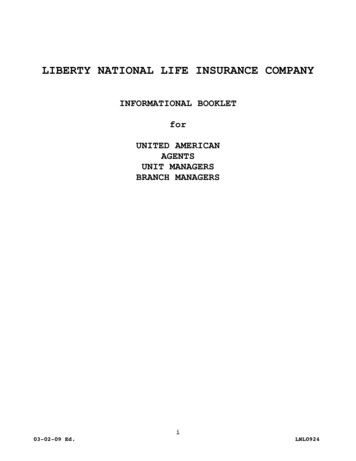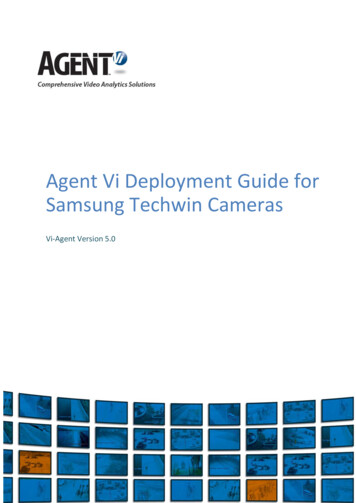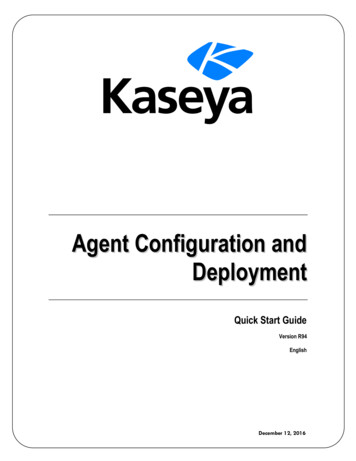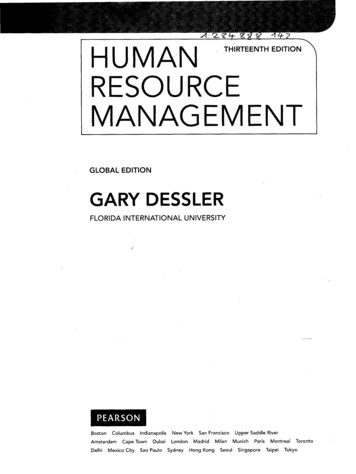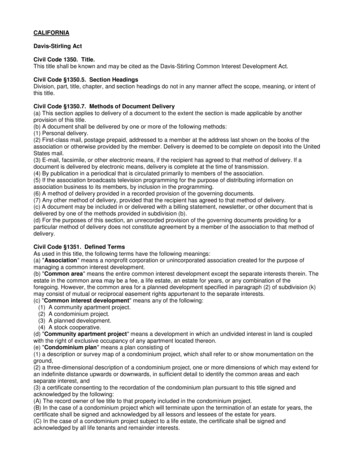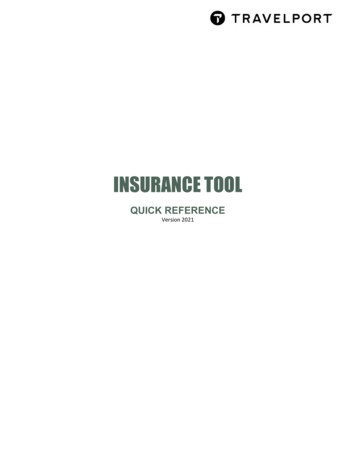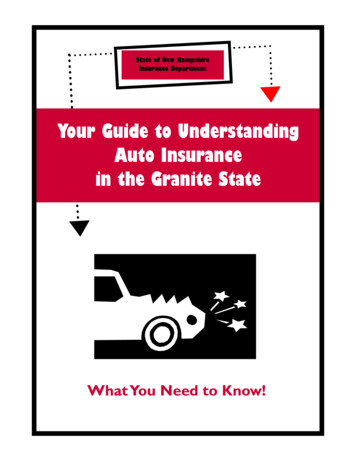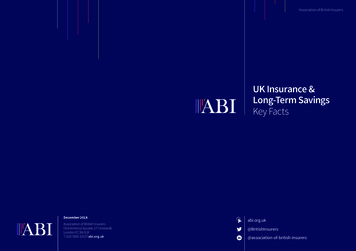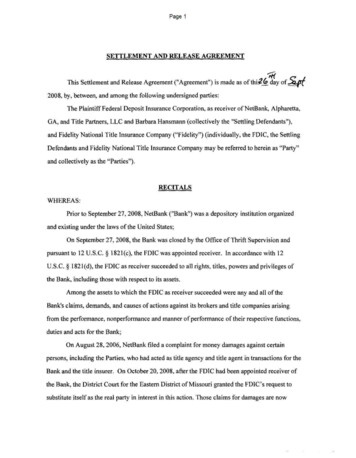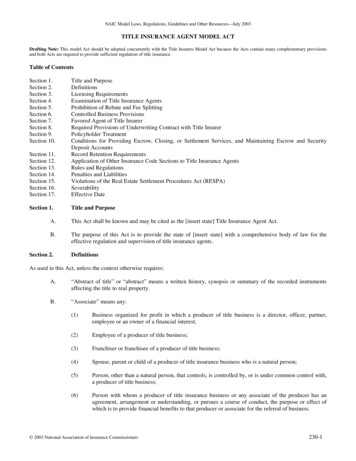
Transcription
NAIC Model Laws, Regulations, Guidelines and Other Resources—July 2003TITLE INSURANCE AGENT MODEL ACTDrafting Note: This model Act should be adopted concurrently with the Title Insurers Model Act because the Acts contain many complementary provisionsand both Acts are required to provide sufficient regulation of title insurance.Table of ContentsSection 1.Section 2.Section 3.Section 4.Section 5.Section 6.Section 7.Section 8.Section 9.Section 10.Section 11.Section 12.Section 13.Section 14.Section 15.Section 16.Section 17.Title and PurposeDefinitionsLicensing RequirementsExamination of Title Insurance AgentsProhibition of Rebate and Fee SplittingControlled Business ProvisionsFavored Agent of Title InsurerRequired Provisions of Underwriting Contract with Title InsurerPolicyholder TreatmentConditions for Providing Escrow, Closing, or Settlement Services, and Maintaining Escrow and SecurityDeposit AccountsRecord Retention RequirementsApplication of Other Insurance Code Sections to Title Insurance AgentsRules and RegulationsPenalties and LiabilitiesViolations of the Real Estate Settlement Procedures Act (RESPA)SeverabilityEffective DateSection 1.Title and PurposeA.This Act shall be known and may be cited as the [insert state] Title Insurance Agent Act.B.The purpose of this Act is to provide the state of [insert state] with a comprehensive body of law for theeffective regulation and supervision of title insurance agents.Section 2.DefinitionsAs used in this Act, unless the context otherwise requires:A.“Abstract of title” or “abstract” means a written history, synopsis or summary of the recorded instrumentsaffecting the title to real property.B.“Associate” means any:(1)Business organized for profit in which a producer of title business is a director, officer, partner,employee or an owner of a financial interest;(2)Employee of a producer of title business;(3)Franchiser or franchisee of a producer of title business;(4)Spouse, parent or child of a producer of title insurance business who is a natural person;(5)Person, other than a natural person, that controls, is controlled by, or is under common control with,a producer of title business;(6)Person with whom a producer of title insurance business or any associate of the producer has anagreement, arrangement or understanding, or pursues a course of conduct, the purpose or effect ofwhich is to provide financial benefits to that producer or associate for the referral of business. 2003 National Association of Insurance Commissioners230-1
Title Insurance Agent Model ActC.“Bona fide employee” of the title insurer or title insurance agent means an individual who devotessubstantially all of his or her time to performing services on behalf of a title insurer or title insurance agentand whose compensation for these services is in the form of salary or its equivalent paid by the title insurer ortitle insurance agent.D.“Commissioner” means the insurance commissioner of [insert name of state], or the commissioner’srepresentatives or the commissioner, director or superintendent of insurance in any other state.E.“Controlled business” means any portion of a title insurance agent’s business written in this state that wasreferred to it by a producer of title insurance business or by an associate of the producer, where the produceror associate, or both, have a financial interest in the title insurance agent.F.“Escrow” means written instruments, money or other items deposited by one party with a depository, escrowagent or escrow for delivery to another party upon the performance of a specified condition or the happeningof a certain event.G.“Financial interest” means a direct or indirect interest, legal or beneficial, where the holder is or will beentitled to five percent (5%) or more of the net profits or net worth of the entity in which the interest is held.H.“Foreign title insurer” means a title insurer incorporated or organized under the laws of any other state of theUnited States, the District of Columbia, or any other jurisdiction of the United States.I.“Non-U.S. title insurer” means a title insurer incorporated or organized under the laws of any foreign nationor any foreign province or territory.J.“Person” means a natural person, partnership, association, cooperative, corporation, trust or other legal entity.K.“Producer” means a person, including an officer, director or owner of five percent (5%) or more of the equityor capital of any person, engaged in this state in the trade, business, occupation or profession of:L.230-2(1)Buying or selling interests in real property;(2)Making loans secured by interests in real property; or(3)Acting as broker, agent, representative or attorney of a person who buys or sells an interest in realproperty or who lends or borrows money with the interest as security.“Qualified financial institution” means an institution that is:(1)Organized or (in the case of a U.S. branch or agency office of a foreign banking organization)licensed under the laws of the United States or any state and has been granted authority to operatewith fiduciary powers;(2)Regulated, supervised and examined by federal or state authorities having regulatory authority overbanks and trust companies;(3)Insured by the appropriate federal entity; and(4)Qualified under any additional rules established by the commissioner.M.“Referral” means the directing or the exercising of any power or influence over the direction of titleinsurance business, whether or not the consent or approval of any other person is sought or obtained withrespect to the referral.N.“Security” or “security deposit” means funds or other property received by the title insurance agent ascollateral to secure an indemnitor’s obligation under an indemnity agreement pursuant to which a title insureris granted a perfected security interest in the collateral in exchange for agreeing to provide coverage in a titleinsurance policy for a specific title exception to coverage. 2003 National Association of Insurance Commissioners
NAIC Model Laws, Regulations, Guidelines and Other Resources—July 2003O.P.Q.“Title insurance agent” or “agent” means an authorized person, other than a bona fide employee of the titleinsurer who, on behalf of the title insurer, performs the following acts, in conjunction with the issuance of atitle insurance report or policy:(1)Determines insurability and issues title insurance reports or policies, or both, based upon theperformance or review of a search, or an abstract of title; and(2)Performs one or more of the following functions:(a)Collects or disburses premiums, escrow or security deposits or other funds;(b)Handles escrow, settlements or closings;(c)Solicits or negotiates title insurance business; or(d)Records closing documents.“Title insurance business” or “business of title insurance” means:(1)Issuing as insurer or offering to issue as insurer a title insurance policy;(2)Transacting or proposing to transact by a title insurance agent any of the following activities whenconducted or performed in contemplation of or in conjunction with the issuance of a title insurancepolicy:(a)Soliciting or negotiating the issuance of a title insurance policy;(b)Guaranteeing, warranting or otherwise insuring the correctness of title searches for allinstruments affecting titles to real property, any interest in real property, cooperative unitsand proprietary leases and for all liens or charges affecting the same;(c)Handling of escrow, settlements or closings;(d)Executing title insurance policies;(e)Effecting contracts of reinsurance; or(f)Abstracting, searching or examining titles;(3)Guaranteeing, warranting or insuring searches or examinations of title to real property or anyinterest in real property;(4)Guaranteeing or warranting the status of title as to ownership of or liens on real property andpersonal property by any person other than the principals to the transaction; or(5)Doing or proposing to do any business substantially equivalent to any of the activities listed in thissubsection in a manner designed to evade the provisions of this Act.“Title insurance policy” or “policy” means a contract insuring or indemnifying owners of, or other personslawfully interested in, real or personal property or any interest in real property, against loss or damage arisingfrom any or all of the following conditions existing on or before the policy date and not excepted orexcluded:(1)Defects in or liens or encumbrances on the insured title;(2)Unmarketability of the insured title;(3)Invalidity, lack of priority, or unenforceability of liens or encumbrances on the stated property; 2003 National Association of Insurance Commissioners230-3
Title Insurance Agent Model Act(4)Lack of legal right of access to the land; or(5)Unenforceability of rights in title to the land.R.“Title insurance report” or “report” means a preliminary report, commitment or binder issued prior to theissuance of a title insurance policy containing the terms, conditions, exceptions and any other mattersincorporated by reference under which the title insurer is willing to issue its title insurance policy.S.“Title insurance sub-agent” or “sub-agent” means a person, other than a bona fide employee of a titleinsurance agent who, on behalf of the title insurance agent, determines insurability and issues title insurancereports or policies, or both, based upon the performance or review of a search or abstract of title, providedthat the performance of actual legal services such as title examination or closing services by a licensedattorney does not render the attorney a sub-agent.T.“Title insurer” or “insurer” means a company organized under laws of this state for the purpose of transactingthe business of title insurance and any foreign or non-U.S. title insurer licensed in this state to transact thebusiness of title insurance.U.“Underwrite” means the authority to accept or reject risk on behalf of the title insurer.Section 3.A.Licensing RequirementsA person shall not act in the capacity of a title insurance agent and a title insurer may not contract with anyperson to act in the capacity of a title insurance agent with respect to risks located in this state unless theperson is a licensed title insurance agent in this state or possesses a license acceptable to the commissionerand issued by this state.Drafting Note: Although a state agency other than the department of insurance might issue a limited license for one or more recognized agent functions, thisdoes not imply a right of a licensed person to perform other agent functions unless lawfully licensed as a title insurance agent under the terms of this Act. Forexample, a state may wish to require licensing or registration of persons handling escrow accounts.Drafting Note: States may want to expand this section to include competence, character, and integrity requirements; application procedures; fee requirements;procedures for withdrawal from the state and continuing education requirements. General state insurance licensing laws should also be considered and perhapscross-referenced or incorporated into this subsection.B.An individual employed by a licensed insurance agent to whom the agent delegates authority to act on thatagent’s behalf shall be either individually licensed or be named on the employing agent’s license. Eachperson named on the license shall possess all qualifications determined by the commissioner to beappropriate. The commissioner may adopt rules, regulations, and requirements relating to licensing andpractices of persons acting in the capacity of title insurance agents. These persons may include title insuranceagents, employees of title insurance agents, and persons acting on behalf of title insurance agents. Thissubsection is not intended to include persons performing clerical functions.C.(1)(2)230-4Every title insurance agent licensed in this state shall:(a)Disclose on all correspondence that the agent is acting in a capacity as agent for a particularnamed underwriter; and(b)Exclude or eliminate the word “insurer” or “underwriter” or similar term from its agency’sname; and(c)Provide, in a timely fashion, each title insurer with which it places business anyinformation the title insurer requests in order to comply with reporting requirements of thecommissioner.A title insurance agent licensed in this state prior to the effective date of this Act shall have ninety(90) days after the effective date of this Act to comply with the requirements of this subsection. 2003 National Association of Insurance Commissioners
NAIC Model Laws, Regulations, Guidelines and Other Resources—July 2003D.E.(1)(a)An errors and omission policy which includes coverage for an agent’s delegation of anyagent functions; and(b)Fidelity coverage if the agent handles escrow or security deposits.(2)The commissioner may promulgate rules specifying acceptable alternatives to the precedinginsurance requirements. The availability of closing or settlement protection shall not be construed tobe an acceptable alternative to the requirements of this subsection.(1)If the title insurance agent delegates the title search to a third party, such as an abstract company, theagent must first obtain proof that the third party:(2)Section 4.The commissioner shall require the title insurance agent and any delegate performing the title searchto maintain the following for the benefit of the title insurer in amounts commensurate with theagent’s average exposure, under terms and conditions, and from insurers acceptable to thecommissioner:(a)Is covered by or maintains the errors and omissions coverage required by Subsection D;and(b)Is operating in compliance with rules and regulations established by the commissioner; andThe third party shall provide the agent and the insurer with access to and the right to copy allaccounts and records maintained by the third party with respect to business placed with the titleinsurer.Examination of Title Insurance AgentsThe commissioner may, during normal business hours, examine, audit and inspect any and all books and records maintained bya title insurance agent under the provisions of this Act. However, if the title insurance agent is a depository institution, thecommissioner shall have the power to examine and investigate the insurance activities of the depository in order to determinewhether the depository institution has complied with the provisions of this Act. The commissioner shall notify the appropriatefederal banking agency of the commissioner’s intent to examine or investigate a depository institution and advise theappropriate federal banking agency of the suspected violations of state law, if any, prior to commencing the examination orinvestigation.Drafting Note: This provision is intended to confer the authority to conduct examinations on an exception basis in the event of regulatory interest in aparticular agency. States may wish to add a section requiring the regular periodic examination of agents and specifying the party conducting the examinationand the party responsible for the cost of the examination. Such a section should include a hardship provision conferring authority on the commissioner to adoptrules reducing the frequency of periodic audits in the case of small agents. Further, in cases where the commissioner believes that access to the non-insurancerelated books and records of a depository institution is necessary, the commissioner must request this information from the functional regulator of thedepository institution through the information-sharing agreements that currently exist.Section 5.A.Prohibition of Rebate and Fee SplittingA title insurance agent or other person shall not provide or receive, directly or indirectly, any considerationfor the referral of title insurance business or escrow or other service provided by a title insurance agent.However, if the title insurance agent or other person is a depository institution, or an affiliate of a depositoryinstitution, the title insurance agent or other person may make a payment to its unlicensed employees forreferrals so long as the unlicensed employee does not discuss specific insurance policy terms and conditions.Further, in the case of a referral of a customer of the depository institution, the unlicensed person may becompensated only if the compensation is a fixed dollar amount for each referral that does not depend onwhether the customer purchases title insurance from the licensed title insurance agent. Furthermore, anyperson who accepts deposits from the public in an area where such transactions are routinely conducted in thedepository institution may receive for each customer referral no more than a one-time, nominal fee of a fixeddollar amount for each referral that does not depend on whether the referral results in a transaction. 2003 National Association of Insurance Commissioners230-5
Title Insurance Agent Model ActDrafting Note: The last sentence of this paragraph further limits the referral for customers of personal, family and household insurance products, such as titleinsurance sold to individuals or families, as a result of Section 305 of the Gramm-Leach-Bliley Act and the subsequent adoption of regulations by the federalbanking regulators at 12 CFR 14.50, 208.85, 343.50 and 536.50. The language in the paragraph was drafted to be consistent with the Gramm-Leach-Bliley Actand the federal regulations while maintaining the integrity of Section 104(d)(2)(B)(iv) and (v) of the Gramm-Leach-Bliley Act. Further, the NAIC crafted thislanguage to be consistent with the provisions of Section 8 of the Real Estate Settlement Procedures Act (RESPA) in that it allows some exceptions specified in12 USC 2607(c)(2).[Optional Subsection B][B.A title insurance agent doing business in the same county as a title insurer or title insurance agent who maybe in violation of the prohibitions or limitations of this section shall have a cause of action against theviolating title insurer or title insurance agent or recipient and, upon establishing the existence of a violation,shall be entitled to injunctive relief as the court may deem necessary or desirable to prevent violations of thissection in the future. In any action under this subsection, the court may award to the successful party thecourt costs of the action together with reasonable attorney fees.]Drafting Note: “County” in the preceding subsection refers to counties, boroughs or parishes defined by the state.Section 6.Controlled Business ProvisionsA.Whenever the business to be written constitutes controlled business, prior to commencing the transaction, thetitle insurance agent shall ensure that its customer has been provided with disclosure of the existence of thecontrolled business arrangement and a written estimate of the charge or range of charges generally made forthe title services provided by the agent.B.The commissioner may establish rules for use by all title insurance agents in the recording and reporting ofthe agent’s owners and of the agent’s ownership interests in other persons or businesses and of materialtransactions between the parties.C.The commissioner may require each title insurance agent to file on forms prescribed by the commissioner,reports setting forth the names and addresses of those persons, if any, that have a financial interest in theagent and who the agent knows or has reason to believe are producers of title insurance business or associatesof producers.[First Optional Subsection D]D.Nothing in this act shall be construed as prohibiting controlled business arrangements in the provision of titleinsurance business so long as:(1)The title insurance agent or party making a referral constituting controlled business, at or prior to thetime of the referral, discloses the arrangement and, in connection with the referral, provides theperson being referred with a written estimate of the charge or range of charges likely to be assessedand otherwise complies with the
A. A person shall not act in the capacity of a title insurance agent and a title insurer may not contract with any person to act in the capacity of a title insurance agent with respect to risks located in this state unless the person is a licensed title insurance agent in this st

